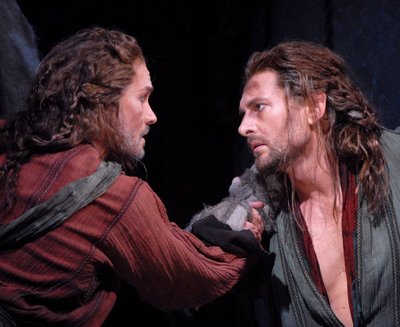
Seattle Opera photo by Bill Mohn
Gluck's operatic masterpiece, the much-neglected Iphigenia In Tauris, premiered this weekend at Seattle Opera. Inexplicably, it's only been staged once at the New York Met, and that was some 90 years ago. In Seattle, never. But it's suddenly hot: San Francisco and Chicago did a co-production with Covent Garden last year, and the Met, looking to spread the cost and risk of staging new productions, asked Seattle to co-sponsor a new Ipigenia, enlisting the artistic team of director Stephen Wadsworth and stage designer Thomas Lynch.
Why revisit this museum-piece from the Baroque, composed ten years before Mozart wrote Don Giovanni? Why revisit the Trojan Wars, for that matter? Because it's a timeless story of blood and vengeance, love and redemption, that resonates to this day. Yet its music is considerably more subtle than, say, Wagner; the instruments of bombast and reverb hadn't been invented yet, so the words, voices and stagecraft have to convey the story's terrors.
Iphigenia's tale of woe begins when she is sacrificed on the altar of Diana by her nutso dad, the Greek king Agamemnon, who wants the gods to send favorable winds so he can lay sack to Troy. Diana saves the girl, but sets her down on the isle of Tauris, where she in turn becomes the high priestess in charge of human sacrifices. (Crime begets crime, circle of violence, etc.) And hey, this is grand opera, so further complications are assured: two Greek refugees wash up, and the fearful local ruler, Thoas, says they must die by Iphigenia's hand. Except that the refugees are Orestes, Iphenegia's brother, and his BFF Pylades.
Placido Domingo will sing Orestes when this reaches Noo Yawk, but the best singing at the Sunday matinee in Seattle came from tenor William Burden as Pylades, who vies with Orestes over who gets to die to save the other. Set free, Pylades mounts a successful rescue mission that results in that operatic rarity, a happy ending.
Plenty of dramatics including an intriguing, three-part set, a giant statue, a flying goddess and a big swordfight. My hunch is that director Wadsworth will tone down choreographer Daniel Pelzig's pointless distractions (priestesses in swooping ballet, guards-in-kilts doing a Highland Fling) before the production moves to the Met (literally, in five semi-trailers). In addition to Domingo as Orestes, mezzo-soprano Susan Graham and tenor Paul Groves will repeat their roles from the San Francisco & Chicago productions. The only Seattle cast member to follow the trucks is the adorable French-Canadian mezzo Michèle Losier, who drops from the sky as Diana at the opera's conclusion in a Deus ex Machina ("God Contraption") with a lyric message of forgiveness.
It's going to be a hot ticket in Gotham, and we saw it here first.
Seattle Opera presents "Iphegenia in Tauris" at McCaw Hall, through Oct. 27th. Tickets $25 and up: 206-389-7676 and online
Leave a comment